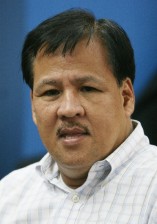Robredo: Who’ll cops obey, court or Palace?
Who will the police follow in the event that the Supreme Court calls on them to help implement its temporary restraining order (TRO) on the inclusion of former President Gloria Macapagal-Arroyo and her husband in the watch list of the immigration bureau?
“The positions [of the executive and judicial branches on the issue of Arroyo’s plan to travel abroad] are not the same, so [it is important] to make sure there will be no chaos,” said Interior Secretary Jesse Robredo, who was among the Cabinet members who saw off President Benigno Aquino III Thursday at Villamor Air Base in Pasay City. The President is attending the 19th Asean summit in Indonesia for the next three days but his instructions to the Cabinet is to maintain the peace. His predecessor’s failed attempt to leave the country on Tuesday night had sparked a crisis.
Robredo said the President had directed him and his colleagues to “ensure the peace if there are developments.” He cited the possibility of street protests and said authorities would make sure that the mass actions would be respected.
Robredo also said the Cabinet would monitor Friday’s special en banc session of the Supreme Court, which was called to allow the justices to deliberate on various petitions concerning the averted foreign trip of Arroyo, now a Pampanga representative.
“Maybe the most significant development will happen [Friday],” Robredo said.
Not wanting the police to be put on the spot in the ongoing row between the Supreme Court and the Department of Justice (DOJ), Robredo said he was seeking legal advice on the matter.
Despite the TRO issued by the high court at noon on Tuesday, Justice Secretary Leila de Lima had insisted that the watch-list order on Arroyo and her husband remained in effect. She ordered immigration and airport authorities to bar the couple from leaving, and directed the Philippine National Police to assist authorities in making sure that the watch-list order would be implemented.
Police in legal dilemma?
On Thursday, De Lima said Mr. Aquino had instructed the Cabinet members concerned to “assess the situation and come up with an appropriate plan of action, depending on the developments.”
“We do have a pending motion for reconsideration [at the high court], so my directive to the Bureau of Immigration stays. That is to prevent the Arroyos from leaving,” she told reporters.
Robredo said he wanted clarification in a situation in which the executive and judicial branches held divergent views on Arroyo’s plan to go abroad, ostensibly to seek medical treatment for her bone ailment.
He pointed out that the Department of Interior and Local Government (DILG) and the police were under the executive branch and were thus following its decisions, but that at the same time, the judiciary had issued a ruling on a matter now opposed by the executive.
“Because of their opposing positions, it’s also important that we take a stand that is according to the law,” Robredo said, noting that the police were normally sought to assist the clerk of court in serving court orders.
On the other hand, he said, the government could not afford to have the police entangled in a legal dilemma.
Robredo said that while his office was trying to get legal advice on the “high-profile” case involving the former President, there were past instances in which the police were confronted with problems in the course of assisting in the servicing of TROs.
But he observed that the TRO issued by the high court was not the usual one: “This is the only TRO that, instead of maintaining the status quo, changes [it].”
Robredo also said that lawyers at the DILG had been looking into the matter, and that he expected feedback from them in one or two days. He said the effort to seek legal advice was his own initiative and based on his “reading of the situation.”
Even at the Asean (Association of Southeast Asian Nations) Summit in Bali, Indonesia, Mr. Aquino was hounded by the controversy over the decision of the executive branch to bar Arroyo from leaving despite the high court’s TRO.
‘Domestic concern’
One of the flurry of questions thrown by foreign journalists at Communications Secretary Ricky Carandang had to do with the “domestic concern” that forced Mr. Aquino to put off his Wednesday-afternoon departure for Bali to Thursday morning.
In response, Carandang reiterated his earlier explanation to Filipino journalists covering the summit: that the decision to bar Arroyo from leaving had to do with a technicality—the Supreme Court’s failure to serve a copy of its TRO on the justice department.
He said that Arroyo was facing an investigation on graft charges and had to seek permission to travel from the DOJ, which is authorized to issue hold-departure orders on persons with pending criminal cases.
“Under Philippine legal procedures, if you are facing an investigation you will need to seek permission before you leave the country. So we’ve applied a statute that has been enforced for many and we applied it in this case as well,” Carandang said in a briefing at the Bali Nusa Dua Convention Center.
Besides, he said, government doctors had determined that the treatment Arroyo would seek abroad for an ailment could be had in Manila.
“Therefore there was no need for her to leave,” he said, adding that the decision on whether to continue to bar Arroyo’s foreign travel lay with the DOJ, which had asserted that the high court’s order would not be final until it ruled on the government’s appeal.
Responding to constitutional experts’ views contradicting the DOJ stand, Carandang said: “Well, I don’t think all the constitutionalists will have that same view. I think what you’re seeing is a typical situation where you have a legal question, five lawyers and maybe six opinions. We don’t expect the legal community to agree all the time on the minutiae of the interpretation of laws.” With a report from TJ Burgonio in Indonesia















